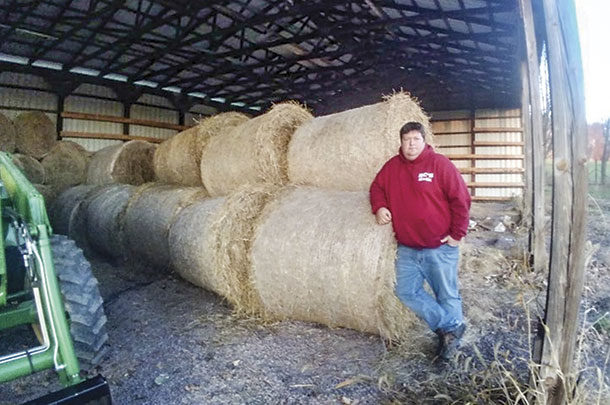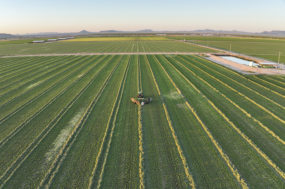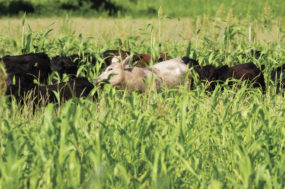Sean Barchik, third-generation farmer from Cambra, Pennsylvania, took a roundabout trek around the world before coming back to the family farm Grandpa started. The farm began with dairy and beef cattle, and his dad continued to expand on it.
After graduation, Barchik headed out to see the world. To say he has done it all might be an understatement. From aerial demolition (where he conquered his fear of heights and traveled all along the East Coast) to maintenance worker to gold/diamond miner in the Amazon rainforest to cross-country truck driver to Amazon employee to mailman (where he got to know his home state and counties much better), Barchik has seen a lot of the world and has lots of different experiences.
He worked from the bottom and climbed the ladder in each of these jobs. He learned how to show up, have a good attitude and do the job with pride. Not all the jobs were pleasant. He didn’t enjoy all of his colleagues, but Barchik shares that these jobs and the experiences he’s had on them has made him into the man he is today.
Back on the farm, Sean’s dad, Robert, sold the dairy cows in 2012 and focused efforts on the hay and corn business. When the cows left, all of them went. The only animal left on the farm was cats, Barchik recalls, laughing. A lot of Robert’s hay customers were taking bulk hay orders and loading right out of the field.
Barchik was gearing up to start a new trucking job out of New York when his dad fell ill. He headed home to help get through hay season and to take care of his dad. Then another hay season rolled around, and they made hay together. In December of 2019, Robert passed away and Sean took over.
Barchik had to just jump in and get things going. He had to figure it all out, and started preparing the equipment for hay season. He started researching. He took one day at a time and did the best he could. The first thing that happened, of course, was a tractor went down, then another. He pulled some tractors out of the back corner of the shed and got them in working order and made it through his first hay season solo.
One of the most gut-wrenching parts was knowing he was in control. He was going to have to be the one who decided when to mow, ted, rake, bale. He was going to have to figure out the best way to market his hay. He was going to have to figure out the equipment and fix the breakdowns, and take the profit and losses that went with those decisions.
When Barchik approached the marketing side of the hay business, he behaved like he did with everything else. He just jumped in. He determined to cut some of the bulk hay orders that were hauled right out of the field. He loaded up some hay and went to auctions. He went to auctions nobody in his family had been to before.
Barchik also focused on increasing the quality of his product. He talked to his customers and determined they wanted hay that had been shredded. The machinery got moved out and in went the hay. Then when the season was over and the hay barn was full, he turned around and started hauling it back out to auction. After some more discussion and evaluation of the market, he determined to switch from big round bales to small square bales. Out came the square baler that was in the back of the barn.
Barchik prefers to mow at night. In the morning, he will ted the hay once or twice to get plenty sun exposure on it, then bale and haul to the barn. He’s looking forward to getting an accumulator for the skid loader this winter to help with next season. The hay is an orchardgrass mix with Kentucky 31, canarygrass – some fields have very light alfalfa, but the majority is orchardgrass.
Barchik is always experimenting with trying different things. He is always trying to streamline things to achieve the shortest time and effort possible to get the hay from field to shed and back out again. “Just try it out,” he says. “You never know until you try.”
Barchik encourages farmers to keep your “head on a swivel.” Look for ways to improve; just because it’s been done a way in the past doesn’t mean it’s the right way now. Never be afraid to try.
Barchik attributes success on the farm during his dad’s illness and after to several people who helped him out. They helped with everything from technical support to advice on chemicals, even letting him use equipment. He appreciates everyone who threw bales and gave him advice during a hard season in his life. He’s humbled and thankful for so many good people in his corner.
A favorite quote of his is from Walt Disney, “We keep moving forward, opening new doors and doing new things because we’re curious, and curiosity keeps leading us down new paths.”









